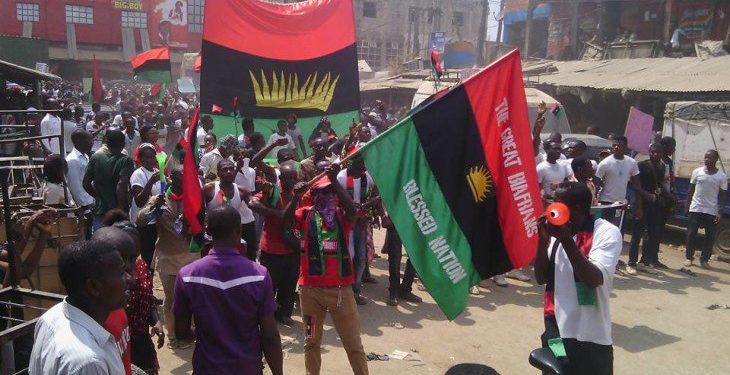The Indigenous People of Biafra (IPOB) has issued a stark warning to Igbo youths in southeastern Nigeria, vehemently discouraging them from joining the Nigerian Army. IPOB argues that enlistment exposes these young people to unnecessary dangers, particularly from Boko Haram and other terrorist organizations operating in the northern regions of the country. The separatist group contends that the Nigerian state systematically discriminates against soldiers from minority ethnic groups, especially the Igbo, and that Igbo recruits are disproportionately deployed to the most dangerous conflict zones as a result of ingrained ethnic prejudice within the military. IPOB’s message is clear: the Nigerian Army is not a viable path to a secure and fulfilling future for Igbo youth. Instead, the group advocates for a return to traditional livelihoods, specifically encouraging young people to engage in farming within their own communities.
IPOB supports its claims with anecdotal evidence, citing widely circulated videos and reports of Nigerian soldiers on the frontlines complaining about deplorable conditions. These accounts detail inadequate allowances and supplies, a severe lack of proper medical care, and insufficient equipment, painting a bleak picture of life within the Nigerian military. The group goes further, accusing the Nigerian government of complicity in the suffering of its soldiers, suggesting that they are used as pawns in covert arrangements between Nigerian politicians and their Western allies. IPOB alleges that military barracks and police stations in the North have been overrun by terrorists while the government simultaneously rewards these same terrorists with cash incentives, job opportunities, and scholarships under the guise of “repentance,” eventually integrating them into the very security forces they previously attacked. This alleged duplicity, according to IPOB, underscores the inherent dangers faced by Igbo soldiers serving a state that seemingly prioritizes political expediency over the well-being of its military personnel.
The consequences of this alleged discriminatory treatment, as portrayed by IPOB, are dire. The group claims that numerous Igbo youths have already perished in these state-sponsored conflicts while those who survive often return home physically and emotionally scarred, bearing the invisible wounds of war with little or nothing to show for their service. IPOB frames military service not as a patriotic duty but as a form of exploitation, arguing that Igbo youth are being manipulated into fighting proxy wars for the benefit of the Federal Government, ECOWAS, and Western imperial powers, particularly in the Sahel region. The group paints a disturbing picture of Igbo soldiers being used as expendable cannon fodder, sacrificed to terrorists or killed by the state itself, with their ultimate fate being either death or dishonor.
IPOB’s message is not merely a cautionary tale; it is a call to action. Instead of risking their lives within what the group describes as an inherently unjust system, IPOB urges young people to invest their energies in their own communities. Farming, according to the group, offers a viable alternative, a path to self-sufficiency and a means of avoiding the potential pitfalls of military service. IPOB contrasts the perceived dangers and exploitation inherent in the Nigerian Army with the potential for a more secure and productive life within the Igbo community. The group argues that even if an Igbo soldier were to succeed within the military, their achievements would likely be viewed with suspicion and framed as a threat to the Nigerian state. Further, any efforts to combat insurgents would be misconstrued as an attack against the North, fueling existing ethnic tensions and potentially placing the soldier in further jeopardy. The message is clear: success within the Nigerian Army is a double-edged sword for Igbo soldiers, potentially leading to further discrimination and persecution.
IPOB underscores its argument by referencing the alleged disappearances and detentions of Igbo soldiers who joined the army since 2020. The group claims that many have died under suspicious circumstances while others languish in military detention simply for advocating for equality. These alleged cases serve as a stark reminder of the risks associated with military service, reinforcing IPOB’s message that the Nigerian Army is a hostile environment for Igbo youth. The group emphasizes that it has issued similar warnings in the past and reiterates its plea for young people to heed its advice. The core message is one of self-preservation: avoid the Nigerian Army at all costs.
In conclusion, IPOB’s appeal to Igbo youths is a multi-layered argument rooted in accusations of systemic discrimination, exploitation, and danger within the Nigerian Army. The group frames military service as a trap, a path leading to death, dishonor, or at best, a life of hardship and suspicion. By highlighting the alleged plight of Igbo soldiers, IPOB aims to dissuade young people from enlisting and instead encourages them to build their futures within the relative safety and autonomy of their own communities. The call to return to farming is not just an economic proposition; it is a symbolic rejection of the Nigerian state and an affirmation of Igbo self-reliance. The message resonates with a sense of urgency, a plea for survival in a system perceived as inherently hostile to Igbo interests.














